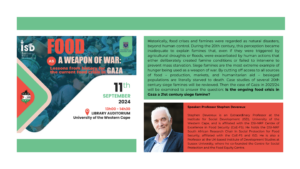Time: 13h00 - 14h30
Venue: Library Auditorium, University of the Western Cape

Historically, food crises and famines were regarded as natural disasters, beyond human control. During the 20th century, this perception became inadequate to explain famines that, even if they were triggered by agricultural droughts or floods, were exacerbated by human actions that either deliberately created famine conditions or failed to intervene to prevent mass starvation. Siege famines are the most extreme example of hunger being used as a weapon of war. By cutting off access to all sources of food – production, markets, and humanitarian aid – besieged populations are literally starved to death. Case studies of several 20th-century siege famines will be reviewed. Then the case of Gaza in 2023/24 will be examined to answer the question: Is the ongoing food crisis in Gaza a 21st-century siege famine?
- Date: 11 September 2024
- Time: 13h00 – 14h30
- Venue: Library Auditorium, University of the Western Cape
Hosted by the Institute for Social Development, University of the Western Cape, and the Palestine Solidarity Association University of the Western Cape.
Speaker: Professor Stephen Devereux

Professor Stephen Devereux. Photo Icon Media Production.
Stephen Devereux is an Extraordinary Professor at the Institute for Social Development (ISD), University of the Western Cape, and is affiliated with the DSI-NRF Centre of Excellence in Food Security (CoE-FS). He holds the DSI-NRF South African Research Chair in Social Protection for Food Security, affiliated with the CoE-FS and ISD. He is also a Professor at the UK-based Institute of Development Studies at Sussex University, where he co-founded the Centre for Social Protection and the Food Equity Centre.
Upcoming Events
Our GOALS
We recognise that producers, processors, distributors and consumers are incorporated into the food system under varying terms and returns. We also recognise the economic, social, human and environmental health impacts associated with food security. Therefore our goal is to conduct research, build capacity and disseminate findings that will promote a sustainable food system in South Africa.
Our MISSION
Our research is concerned with the scale, nature, causes and consequences of food insecurity in South Africa and elsewhere on the African continent. Thus our mission is to investigate products, technologies, processes and policies that can reduce food insecurity and mitigate its negative outcomes. We seek to make a difference to food security by linking innovative science with critical enquiry.



